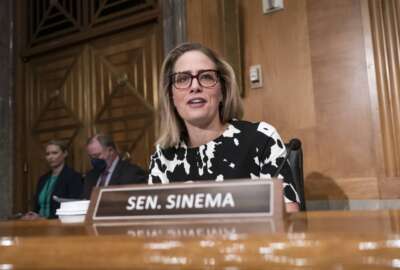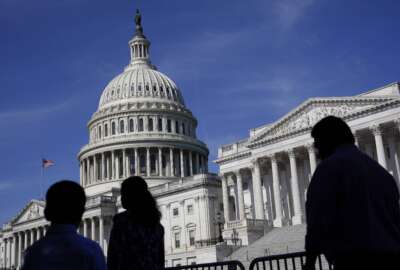Hubbard Radio Washington DC, LLC. All rights reserved. This website is not intended for users located within the European Economic Area.
Retirement changes for former seasonal feds, higher death benefits and other bills to watch
For federal employees and federal retirees, Congress is eyeing changes to catch-up contributions, death gratuities, Social Security benefits and more.
Congress once again has its sights set on making changes to federal benefits in more ways than one.
Under one reintroduced bill, former temporary and seasonal federal employees would get a chance to make “catch-up” contributions in their retirement accounts.
Reps. Derek Kilmer (D-Wash.), Gerry Connolly (D-Va.), Don Bacon (R-Neb.) and David Valadao (R-Calif.) reintroduced the Federal Retirement Fairness Act last week.
Even though many temporary feds eventually transition to permanent employment in the government, seasonal and temporary federal employees currently don’t have the opportunity to make retirement contributions during their time spent in their previous, temporary roles.
Several years ago, lawmakers said they noticed that formerly temporary workers had to work longer than their colleagues in government to receive the same retirement benefits. To try to correct the disparity, Kilmer first introduced the Federal Retirement Fairness Act in 2019.
Decades ago, the Office of Personnel Management did let these federal employees make catch-up contributions, Kilmer said. But Congress eliminated the option when the federal government transitioned to the Federal Employees Retirement System (FERS) in the 1980s.
The Federal Retirement Fairness Act aims to give former seasonal and temporary federal employees, such as wildland firefighters and park rangers, who convert to full-time government employment a chance to make catch-up retirement contributions to be able to retire on time.
So far, there is no Senate companion bill for the House legislation.
Unions and federal organizations, including the American Federation of Government Employees (AFGE), the Federal Managers Association (FMA) and the National Federation of Federal Employees (NFFE) are supportive of the bipartisan bill.
“These dedicated workers face a choice — leave the federal service without full retirement benefits or work longer than their peers to obtain their full retirement benefits,” NFFE National President Randy Erwin said in a statement. “For workers in physically demanding or dangerous jobs, this is a choice between two bad options — retire without the security you thought you would have, or put your health and safety at risk by working a few years longer than the rest of your peers.”
Beyond the Federal Retirement Fairness Act, here are three other bills to watch.
Greater death benefits for civilian federal employees
Both House and Senate lawmakers are taking another shot at increasing death benefits for the civilian federal workforce.
The legislation, which Sen. Kyrsten Sinema (I-Ariz.), and Reps. Gerry Connolly (D-Va.) and Brian Fitzpatrick (R-Pa.), reintroduced earlier this month, would update the benefit amounts for families or survivors of civilian federal employees who die while performing job duties.
Families of federal employees who are killed on duty receive a one-time benefit payment as well as a payment to help cover funeral expenses.
Sinema and other bipartisan co-sponsors said the Honoring Civil Servants Killed in the Line of Duty Act would bring death benefits for civilian federal employees in line with the benefit amounts that military members already receive.
Right now, eligible survivors of Foreign Service and military members who die either while on active duty or while serving in certain reserve statuses receive a one-time, tax-free payment of $100,000, regardless of the cause of death.
But for civilian federal workers, the amount included in death gratuities has not been updated since 1997. The coverage amount for funeral expenses has not changed since 1966.
Currently, survivors of federal employees who die while performing work duties receive $10,000 in a one-time benefit and $800 to cover funeral expenses.
If the bill is passed, the benefit amounts would increase ten-fold. Survivors would receive $100,000 in the death benefit payment and another $8,800 to go toward funeral expenses.
“This gap in the law has devastating consequences for family members who must now face financial and emotional strain at the same time,” Larry Cosme, national president of the Federal Law Enforcement Officers Association, said in a statement. “This legislation solves that problem to ensure all survivors of federal employees killed in the line of duty are entitled to equal and robust financial benefits to honor their lost public servants.”
The bill also aims to prevent the death benefit amounts from becoming outdated by including an automatic cost-of-living adjustment to the death and funeral benefits.
The Senate Homeland Security and Governmental Affairs Committee (HSGAC) plans to mark up the legislation Wednesday.
Long-time effort to repeal Social Security “evil twins”
Some retired federal employees and their spouses may see yet another chance at receiving full Social Security benefits.
Reps. Garrett Graves (R-La.) and Abigail Spanberger (D-Va.), and Sens. Sherrod Brown (D-Ohio) and Susan Collins (R-Maine), reintroduced the bicameral Social Security Fairness Act in January.
If enacted, the bill would revoke the Windfall Elimination Provision (WEP) and the Government Pension Offset (GPO). The two decades-old provisions of the 1935 Social Security Act reduce or in some cases eliminate Social Security benefits for one particular subset of retirees in the Civil Service Retirement System (CSRS).
The WEP specifically affects federal employees and other public sector workers who receive an annuity from their time in government but who also worked in a Social Security-covered job, usually a position in the private sector. The WEP does not impact retirees in the Federal Employees Retirement System, since FERS employees already pay into Social Security.
Lawmakers have continuously reintroduced the bill for decades, but just last year, the legislation gained some unprecedented traction. Last Congress’ version of the bipartisan legislation had 305 House cosponsors and 42 Senate cosponsors.
Currently, the Social Security Fairness Act has 298 cosponsors in the House — above the 290-member threshold necessary to file a motion to put the bill on the House consensus calendar.
By passing that threshold, it’s possible that the House Ways and Means Committee could take up the bill and advance it. Alternatively, though less likely, lawmakers may be able to force a floor vote.
Several other introduced bills would also alter WEP and GPO for federal retirees:
Public Servants Protection and Fairness Act
Equal Treatment of Public Servants Act
Bringing more “accountability” to federal telework
Finally, lawmakers took another approach to address the future of telework and remote work policies for the federal workforce.
Earlier this month, Sens. James Lankford (R-Okla.) and Kyrsten Sinema (I-Ariz.) introduced the Telework Reform Act, aiming to add more accountability and transparency to federal telework.
Specifically, the Telework Reform Act would codify the working definitions of telework and remote work, in effect requiring teleworking federal employees to report to the office at least twice per two-week pay period.
Among its many provisions, the bill would also set more data requirements and call on agencies to report to Congress annually on productivity outcomes and cost savings of telework and remote work.
The legislation was referred to HSGAC, but so far there is no companion bill in the house.
Copyright © 2024 Federal News Network. All rights reserved. This website is not intended for users located within the European Economic Area.
Drew Friedman
Drew Friedman is a workforce, pay and benefits reporter for Federal News Network.
Follow @dfriedmanWFED
Related Stories
Related Stories
-
Senate bill would improve death benefits for civilian feds Federal Newscast





